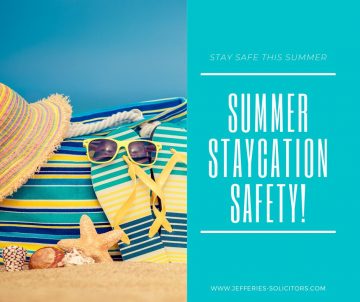




How To Stay Safe This Summer and Avoid An Accident
If you’re having your holiday in the UK, there is still fun and adventure to be had. There are plenty of beaches, lodges, caravan and camping sites, plus a whole heap of tourist attractions to visit, to make this year’s staycation one to remember.
Plus, there’s the BBQ and paddling pool to dig out and outdoor sports to play, not to mention the bike rides to take and walks to be had. But is there anything you can do to make it safer for you and your loved ones?
- Stay hydrated, drink plenty of water in the heat.
- Avoid alcohol and drinks containing caffeine as they dehydrate you
- Wear sunscreen, shades, and a hat
- Stay cool and in the shade as much as possible
You can be sun-safe this summer and have still fun.
Common Summer Accidents
Water Accidents
Swimming Pools
-
Look for signs that state the depth of the pool before diving in
-
Keep an eye on children at all times when near or in water, staying within arm’s reach at all times
-
Never run near a swimming pool
-
Wear a life-jacket on boats
-
Do not enter the water after drinking alcohol
-
If someone is in trouble in the water don’t go in; throw them a life preserver such as a life jacket or a life ring
-
Swim only in designated areas
Boating
Boating is an area covering many types of recreation including yachting in Dartmouth or, rowing, canoeing and sailing, or you might catch a ferry in Cornwall. Alternatively, you may work on a boat if you are employed by a fishing or ferry company. If you have sustained an injury while on a boat, you may be entitled to claim boat injury compensation.
Boat owners are legally obliged to carry public liability insurance to protect against accidents; ferry, fishing and cruise liner companies are subject to the same health and safety rules set down by the Health and Safety Executive to protect employees and customers. Leisure companies and tour operators organising excursions involving boats also have legal obligations to ensure the safety of participants.
Boating accidents are very diverse and can result in major health problems for some people. A head injury from a canoeing accident, for example, can be very serious and leave an individual with total dependency on his/her family.
To avoid accidents:
- Always wear a life jacket on a boat
- Go out in good weather
- Make sure the boat, canoe or yacht is in good working order before using it
Cycling Accidents
1. PUMP YOUR TYRES
Make sure your bike is fit for the road before heading out. Ensure that your tyres are pumped to the correct pressure before you begin your journey. To know what the right pressure for your tyres is, you just need to look at the sidewall of the tyres where a recommended range will be written based upon the conditions you are going to be cycling in.
2. WEAR THE RIGHT CLOTHES
Wear the right clothes for the weather and conditions you are cycling in, for example, waterproof clothing and high visibility clothing, especially at night. This can include a head torch and a reflective safety jacket. You can also get a high visibility helmet or hi-vis stripes that you can attach to your helmet.
You should also wear cycling gloves or mitted gloves if you are intending to ride for a long time.
3. TAKE THE RIGHT EQUIPMENT
Take a bag with you which includes essential items like water and food for a long bike ride. Plus a multi-tool kit that can help you fix your bike if you encounter any mechanical problems while riding your bike.
4. CONSIDER RIDING WITH OTHERS
Not only will this help you improve your cycling as you can learn from others, but it can help ensure your safety, whether you are riding down isolated trails or well-worn roads. Cycling with a friend ensures that someone can help you if you encounter a serious problem. There is always safety in numbers.
These steps can make a big difference in preventing accidents and injuries. However, accidents can still happen.
Dog Bites
-
Do not approach a dog if it looks uncertain of you
-
Never put your face near to a dog’s face
-
Don’t leave a baby or child alone with a dog regardless of the history a dog may have
Victims of more serious dog bite injuries could potentially require emergency medical treatment. The consequences of a bite injury can be devastating for these people. A prolonged stay in hospital, physical impairment or extensive psychological damage are some examples of the traumas one might sustain.
Any witnesses of a dog attack should call 999 immediately. A person should also try to administer basic first aid to the victim in order to stop any bleeding and limit the chance of infection occurring. Antibiotics could be required for infected wounds further down the line. Other serious conditions, such as blood poisoning, can also result from a dog bite wound.
Young children, couriers, postmen and women are generally the most susceptible victims of dog attacks. You could be entitled to claim personal injury compensation if you or a loved one have suffered from a dog bite injury in the last three years.
